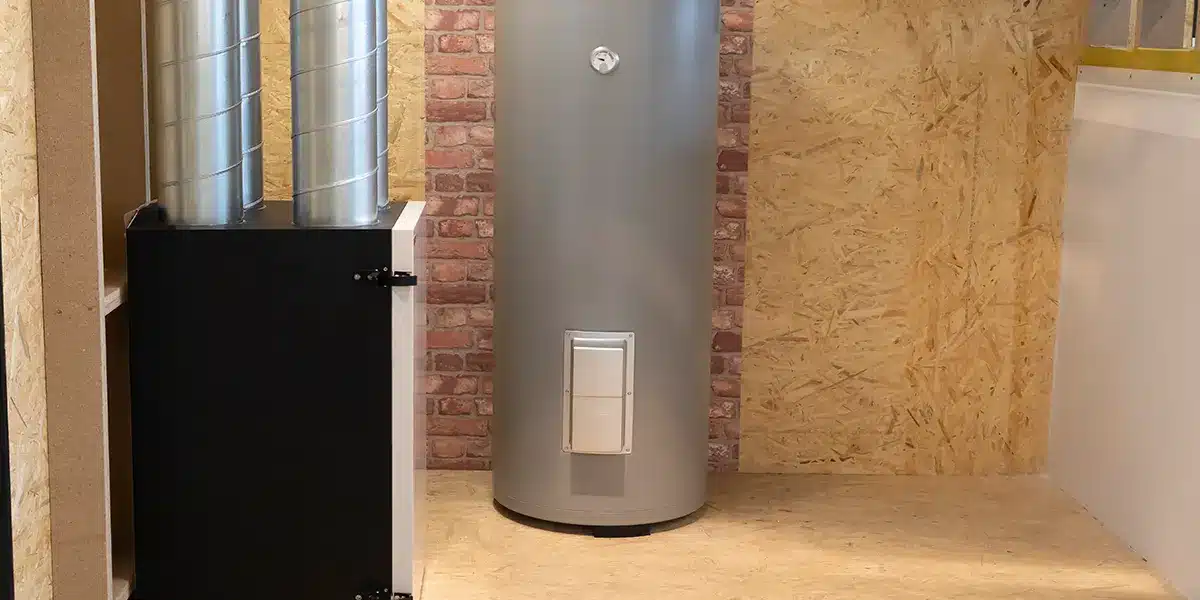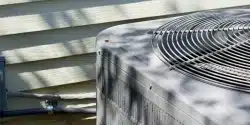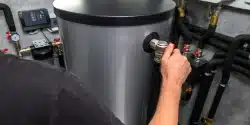Hot water is something most of us take for granted, until it runs out, that is! If you’re planning a new water heater installation, you’re likely weighing your options: should you stick with a traditional storage tank water heater or consider switching to a tankless model?
This debate, hot water tank vs tankless, isn’t one-size-fits-all. The right choice depends on factors like your household size, energy goals, budget, and the type of property you live in. Below, we’ll explore the pros and cons of both systems, how they perform in different residential and commercial settings, and what else you should consider before deciding.
How Water Heaters Work
Traditional Hot Water Tanks
Tank water heaters typically store a large supply of hot water in an insulated tank. The system constantly heats and reheats the water to maintain a set temperature, so it’s ready whenever you turn on the tap.
- Capacity: Usually 30–80 gallons of stored water.
- Fuel: Can be powered by gas or electricity.
- Lifespan: Around 8–12 years.
- Nickname: Sometimes referred to as “storage heaters” because they always keep water hot.
Pros: Lower upfront installation costs, reliable supply for multiple fixtures at once.
Cons: Can run out of hot water, less energy efficiency, and higher utility bills due to standby heat loss.
Tankless Water Heaters
Also called on-demand water heaters, tankless systems don’t store hot water. Instead, they heat it instantly as it flows through the unit when you turn on a tap.
- Capacity: Essentially unlimited, as long as demand doesn’t exceed system size.
- Fuel: Available in gas or electric.
- Lifespan: Up to 20 years with good maintenance.
- Nickname: “On-demand heaters” because they only run when hot water is needed.
Pros: Excellent energy efficiency, compact size, longer lifespan.
Cons: Higher installation costs, may require upgraded gas lines or electrical service, and can struggle if too many water sources are used at the same time.
Hot Water Tank vs Tankless: Key Comparisons to Consider
- Supply of Hot Water: Storage tanks can run out of hot water during high demand, while tankless models provide continuous hot water, making them ideal for large families or commercial kitchens.
- Energy Savings: Tankless models reduce standby heating, often leading to 10–30% lower bills. Tanks consume more energy maintaining temperature.
- Space: Tankless units are compact and wall-mounted; tanks take up floor space, which you may want for storage instead.
- Cost: Tank water heaters typically cost less to install, while tankless water heaters have higher upfront costs but longer lifespan (up to 20 years).
- Maintenance: Both require flushing, but tankless models in hard water areas may need annual descaling.
- Property Requirements: Tankless installations may need upgraded gas lines or electrical circuits to perform optimally.

What Works Best for Different Property Types
Single-Family Homes
- Smaller households (1–3 people): A 40–50 gallon traditional water heater is often sufficient and cost-effective. It’s still recommended for occupants to be mindful of using too many water sources simultaneously.
- Larger households (4+ people): Families often benefit from tankless models for endless hot showers, dishwashing, and laundry back-to-back. While the installation costs are higher, the convenience and energy savings pay off over time.
Condos & Apartments
Space is often limited, making tankless water heaters attractive since they’re wall-mounted and don’t take up valuable floor space. For units with modest water demands, even a compact stored water heater may work just fine, but a tankless water heater provides added efficiency.
Rental Properties
For landlords, tank water heaters typically make more sense due to lower upfront costs. They’re reliable, easy to replace, and tenants usually don’t mind occasional lack of hot water during peak use.
Commercial Properties
- Restaurants, salons, gyms: Demand for continuous hot water makes tankless models the clear winner, especially when paired with multiple units.
- Offices and small businesses: A traditional hot water tank is often more economical, unless high demand makes tankless a better long-term investment.
Multi-Family Developments
Developers often choose storage tank vs tankless water heaters depending on unit size and expected load. In luxury multi-family projects, tankless models are increasingly popular for their compact size, long lifespan, and efficiency.
Other Considerations When Choosing Between Tank and Tankless
Energy Efficiency
- Tankless models can be 24–34% more efficient for homes using less than 41 gallons per day.
- Storage tanks lose heat while maintaining water temperature, which impacts overall efficiency.
Installation Costs
- Storage tank water heaters have lower upfront costs.
- Tankless installations can be 2–3 times more expensive due to unit cost and potential upgrades to gas lines or electrical systems.
Lifespan
- Storage tanks: Average 10–15 years.
- Tankless water heaters: Up to 20 years with proper maintenance, meaning fewer replacements over time.
Fuel Source: Gas or Electric
- Gas units heat faster and handle higher demand, but require venting and sometimes larger gas lines.
- Electric models are easier to install but may struggle in high-demand households.
Climate & Usage
In colder climates, tankless systems may need more power to heat incoming water. For Kelowna’s seasonal temperatures, sizing is crucial to avoid supply issues.

Which System Is Right for You?
The decision between hot water tank vs tankless ultimately depends on your priorities.
Choose a traditional water heater if:
- You want lower upfront costs.
- Your household has steady, moderate hot water use.
- You’re planning to sell your home soon and don’t need a long-term solution.
Choose a tankless water heater if:
- You want unlimited hot water and higher energy efficiency.
- You plan to stay in your home for many years.
- You’re willing to invest more upfront for long-term savings.
- You want to save space or free up a utility room.
Comparing Different Types of Water Heaters
When you’re weighing storage tank vs tankless water heaters, it’s also important to consider the fuel source and style. The types of water heaters you can choose from generally fall into the following categories.
Gas Water Heaters
- Gas-powered models heat quickly and are often cheaper to operate if natural gas is available in your area.
- They may require venting and, for tankless units, upgraded gas lines to handle higher demand.
- Many homeowners appreciate that gas units recover faster when demand is high.
Electric Water Heaters
- Electric tanks are easier to install and don’t require venting, making them a common choice in condos and smaller spaces.
- They heat more slowly and may increase utility bills, especially for large families.
- Electric tankless models are compact but may require a service upgrade to your panel.
Hybrid Water Heaters (Heat Pump Models)
- These combine a heat pump with a traditional tank, pulling warmth from the surrounding air to heat water.
- Hybrids offer excellent energy efficiency but require space for air circulation.
- They’re gaining popularity in residential applications where reducing energy use is a priority.
Practical Factors to Weigh Before Deciding
Choosing between tank and tankless water systems isn’t just about technology; it’s about what works for your household or business.
- Budget: Traditional water heaters have the lowest upfront installation costs, while tankless models require more investment but last up to 20 years.
- Usage Patterns: A small family that uses water at predictable times may do fine with a tank, while a busy household with multiple showers, laundry, and dishwashing at once benefits from tankless.
- Energy Savings: If lowering utility bills and being eco-friendly matter to you, energy-efficient tankless water heaters or hybrid heat pump models are the best bet.
- Space: Stored water heaters take up more room, while tankless frees up floor space and is mounted on the wall.
- Resale Value: Upgrading to a modern, energy efficient system can boost home value, particularly in competitive real estate markets like Kelowna.
- Commercial Properties: Think about not just daily demand but also the long-term reliability. Restaurants and salons, for instance, can’t afford downtime from running out of hot water.
When it comes to hot water tank vs tankless, there’s no universal answer. Tank water heaters typically make sense for smaller households, landlords, and budget-conscious buyers. Tankless models, on the other hand, are an excellent choice for families, businesses with high demand, and anyone looking for long-term energy savings and efficiency heating.
At Husky Heating & Cooling, we help homeowners and businesses across Kelowna choose the right type of water heater for their space, budget, and lifestyle. Whether you’re considering replacing your furnace and adding a water heater upgrade, or planning a new build with energy-efficient systems, our team of HVAC professionals can walk you through the options.
Contact us today to discuss your next water heater installation and find out which system will keep your home or business comfortable for years to come.











